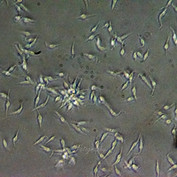
Jimenez Lab


Research
Protozoan parasites have a significant impact in global health, infecting millions of people around the word. The research in my laboratory is focused in studying the role that ion channels play in sensing and adaptation to environmental conditions in protozoan parasites like Trypanosoma cruzi, causing agent of Chagas disease, and Trypanosoma brucei, the human parasite responsible for sleeping sickness. During their life cycle, protozoan parasites are exposed to changing external conditions and different hosts. Successful transmission of the parasite depends on the ability of the cells to trigger adaptive responses and cope with stressors, while regulating proliferation and transition to different life stages.
Ion channels are key components of the sensing machinery in all types of cells and play an important role in the responses against environmental stressors. The goal of our research is to analyze the role that mechanosensation and ion homeostasis play in parasite differentiation, survival and infectivity. We are interested in understanding how mechanosensation regulate the host-parasite interaction and we hope to use that information for developing new therapeutic tools against tropical neglected diseases.
We integrate cellular and molecular biology tools with biophysical approaches to study ion channel physiology. We foster an inclusive environment that potentiates creativity and
critical thinking, and welcomes diversity as a source of inspiration.